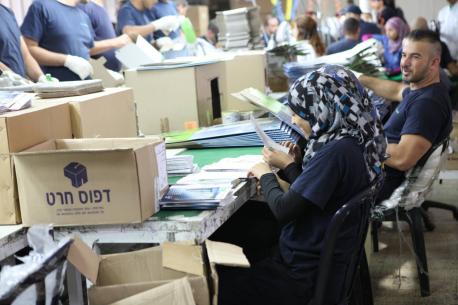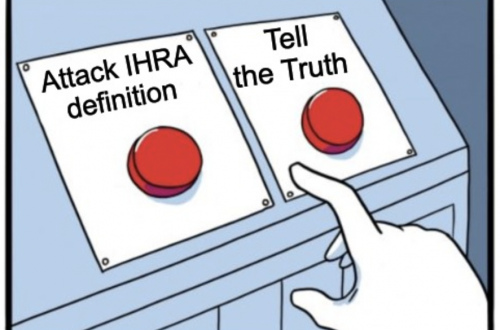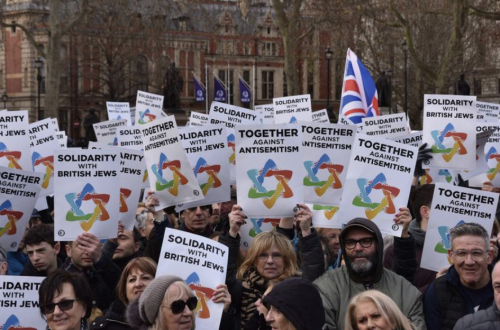This is a cross post from CIFWatch
To those who genuinely seek Israeli-Palestinian reconciliation, and a future of peace and coexistence, the Israeli-based company SodaStream is a model which should be studied and emulated.
The company, which produces an environmentally sustainable product that allows for soda to be produced at home without wasting plastic bottles, operates one of their seven manufacturing plants at the Mishor Adumim industrial park (10 minutes from Jerusalem). The plant employs Israeli Jews, Israeli Arabs, Palestinians, and Druze – with some of the Arabs having achieved management level positions at their West Bank facility. Additionally, the company provides Muslim employees use of company prayer room, accompanied by break time so that they can pray – as well as benefits for all employees which includes transportation to the facility, subsidized daily meals, medical aid, maternity leave, vacation and a pension plan.
SodaStream employs more than 500 West Bank Palestinians (making the company the largest single employer of Palestinians outside of the Palestinian Authority) at a salary dramatically higher than what they could earn elsewhere
 Workers at the SodaStream factory in Mishor Adumim
Workers at the SodaStream factory in Mishor Adumim
The Times foreign correspondent Catherine Philp, in a story titled ‘Fizzy drinks SodaStream giant caught in EU rules on Israeli settlements‘ (behind pay wall), focuses on how new EU guidelines on the funding of projects in Judea and Samaria (and labeling rules regarding products produced in such communities) may affect the company’s operations, and also provides some background on (the thus far completely unsuccessful) BDS activities against the company.
Philp also cites an interview she conducted with a SodaStream employee, who she introduces thusly:
Five days a week, for twelve hours at a time, Faiz Abedy stands by a chugging conveyor belt, picking off SodaStream bottles and packing them into cardboard boxes to be sent off around the world.
It is “exhausting, backbreaking work” but he is grateful for it. His salary, three times that of the average Palestinian worker, rescued his family from destitution
However, Philp, further in the report, also threw in this line, after quoting “Mr. Faiz”:
Faiz says his job is the best he could possibly hope to get in the area, but has few illusions about SodaStream’s motives. Industries that choose to locate in the West Bank benefit from similar economic incentives and tax breaks as individual settlers themselves, so doing so makes financial sense.
While SodaStream pays well above the Palestinian average, the labour still comes far cheaper than that of Israeli worker. “We take whatever they give us,” Faiz says with a note of reproach.
The final passage of course suggests that SodaStream pays Palestinians less than they pay Israeli Jews. So, I decided to take a trip down to SodaStream’s corporate offices at Airport City (with a colleague) to ask the company’s CEO Daniel Birnbaum about the allegations. While we spoke for over an hour about many aspects of company operations, here’s a short clip of my question to him about the charge of a disparity in pay.
Additionally, I spoke to an Arab Israeli production manager at the Mishor Adumim plant, named Barhum Muhammed, on the phone about the allegation, and recorded his response.
We also asked Birnbaum about the claim made in the story that the company gets tax breaks for locating across the green line. Birnbaum categorically denied that SodaStream gets any special ‘West Bank’ tax breaks beyond the tax incentives any Israeli company gets for locating in the periphery of the country (such as in undeveloped areas, like the Negev).
Finally, we were curious about the Times interviewee, Faiz Abedy, and wanted to ask the Palestinian a few follow-up questions based on the responses he purportedly gave to Philp. Remarkably, Birnbaum told me that, after thoroughly checking SodaStream employee records for a Faiz Abedy, no such employee actually exists. (Note that the reporter didn’t say a word about the name being a pseudonym)
While we’ve demonstrated that the story by Catherine Philp includes a significant misrepresentation of SodaStream’s treatment of their Palestinian workers, we will certainly be in contact with Times editors and update this post when we’ve learned more about the true name and identity of the employee allegedly named “Faiz Abedy”.




